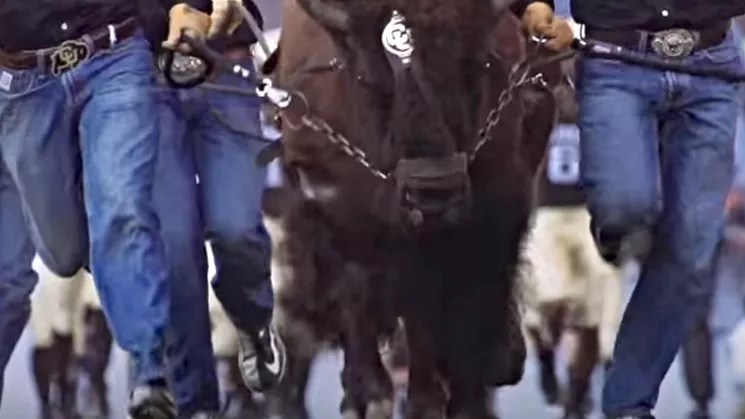
University of Colorado Boulder via YouTube

Audio By Carbonatix
A lawsuit filed late last year against the University of Colorado Boulder was intended to force the institution to divulge details about huge multimedia sports deals typically hidden from public view because they are supposedly the purview of its athletic-rights partner, technically a private institution – albeit one that just happens to have its address at Folsom Field, CU Boulder’s football stadium.
By the order of Boulder County District Judge Patrick Butler, the documents in question are now in the hands of the plaintiff – journalist Daniel Libit of The Intercollegiate, a vibrant website that takes a hard-news approach to covering college sports. But according to CU Boulder spokesperson Joshua Lindenstein, this mandate wasn’t necessary.
“Prior to the court order being issued, the university was in the process of producing the records to which we have access,” Lindenstein maintains.
Libit isn’t buying that line. “I’m pleased that I was ultimately able to receive records that should have been turned over to me initially,” he says, “but it’s telling that this only happened after I filed suit.”
This year, make your gift count –
Invest in local news that matters.
Our work is funded by readers like you who make voluntary gifts because they value our work and want to see it continue. Make a contribution today to help us reach our $50,000 goal!
While the dispute’s end has just been revealed, Butler’s order actually came down on February 23, and Libit received the information a few weeks later, prior to the expiration of a deadline set by the judge. And the result of the court confrontation could have a far-reaching impact on transparency at major universities.
“We’re talking about millions of dollars of business involving the university using public assets like facilities that’s largely done in secret,” Libit had explained in an earlier interview.
Proof of this contention can be found in CU Boulder’s controversial $1.625 million contract with PointsBet, an online gambling operation, which only became public after Libit threatened to sue in order to get a look at it. In early October, just before he planned to file his lawsuit, CU Boulder released the document to both The Intercollegiate and Sports Illustrated, with the latter publishing its story first and reaping the benefits of Libit’s behind-the-scenes battle.
In that case, Libit told us, CU Boulder capitulated because it was in physical possession of the PointsBet contract – but that’s not standard operating procedure. Generally, documentation remains in the hands of Buffalo Sports Properties, a branch of Learfield Communications, a Dallas-based concern that works with universities around the country. “As exclusive athletics multimedia rightsholder,” the BSP web page states, “Buffalo Sports Properties manages all aspects of the rights relationship including venue signage; event sponsorships and promotion; corporate hospitality; television; digital engagement and visibility through the official athletics website CUBuffs.com; as well as radio game broadcasts and coaches’ shows.”
Under such agreements, “public universities are able to claim that they’ve farmed this all out to a private company,” Libit noted.
To open up the deals to scrutiny, Libit filed suit in Boulder County District Court under the auspices of an LLC called Scrutiny Is Unity on December 2, arguing that specific Buffalo Sports Properties work product constitutes public records as defined by the Colorado Open Records Act (CORA). A key passage: “If the records reveal what is fairly and reasonably implied by the circumstances, that they were made, maintained, or kept for the function of conducting public business and are therefore ‘public records,’ Mr. Libit and Scrutiny request that the Court find that UCB has violated CORA and order the records to be released.”
Do universities create relationships like the one involving Buffalo Sports Properties solely to hide big-buck transactions? “I wouldn’t see that as their primary function,” Libit said in his earlier interview, “but I definitely think it’s a perceived benefit. I think the primary reason universities engage with companies like Learfield is to handle things in a way that gives them a level of certainty that they’ll be making X amount of dollars a year on their multimedia rights. There’s also a huge incentive for athletic directors to get in good with this massive company that prevails over college athletics – and it’s just the way business has been done. But from my perspective, a great disservice to the public is a consequence of these arrangements. A lot of business involving a university’s athletic department is done in secret, and we’re talking about millions and millions of dollars.”
Butler’s ruling wasn’t a slam dunk for Libit. Take this passage, related to Libit’s requests for email communications: “If the emails are maintained in such a manner as to give Defendant access to them, and the emails concern the institution’s authorized activity or the use and expenditure of public funds, then Defendant shall produce these emails to Plaintiffs under CORA. If not, the Court cannot find these email communications are public records as defined by CORA.”
Still, Libit sees the order as a step in the right direction. “Like CU did in this instance,” he concludes, “our public universities are too often inclined to find reasons to conceal information that should be disclosed to the public.”
Click to read the order in the case of Daniel Libit v. University of Colorado Boulder and the original complaint.